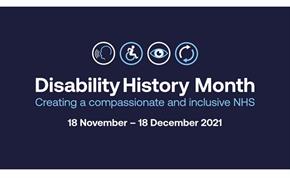
To mark Disability History Month, Ryan talks about how he came to receive his diagnosis of Usher Syndrome Type 2A, and his experiences with the disability.
I’m Ryan, age 30, and I work as a transport coordinator in Colchester hospital. My hidden disability is Usher Syndrome Type 2A.
I was on holiday with my family in Florida aged 18 when I was queuing for rides in some poorly lit indoor areas, and I remember saying to my mum ‘I can’t see’ and holding out for her to guide me. My family thought I was pulling a prank, so they kept running off and leaving me, I often recall these memories when I need a few favours!
When we got home from that holiday, my mum was hiding behind a door in my bedroom (yep clearly my family love a prank) and I didn’t see she was there. Even when I shut the door, I didn’t see her, and then she recognised something really was wrong with my eyesight.
After a lot of tests, I was referred to Moorfields Eye Hospital in London where I was eventually diagnosed with Usher Syndrome Type 2a. This is a genetic condition which is characterised by hearing loss from birth and progressive vision loss that begins in adolescence or adulthood. Vision loss is due to Retinitis Pigmentosa. Night vision begins first, followed by blind spots that develop in the peripheral vision.
As I was diagnosed as 75% high frequency hearing loss at 18 months old, this was something I didn’t know any different about. My sight loss on the other hand has been and continues to be, at times, very difficult to live with. My eyesight has continued to deteriorate over the past 12 years. People ask me ‘what can’t you see?’, if only I knew then I wouldn’t perhaps walk into things all day!
I’ve also become more aware since having our son who is now two. I’m over six foot and as my sight has drastically closed in, I regularly walk into Jaxon, and his toys! Let me tell you that a 2-year-olds toys are very painful, there are cars, building blocks, toy figures, you name it I’ve stepped on it (and yes broken many of them). As for Jaxon well he is now accustomed with dodging out of Daddy’s way! Its also worth mentioning his favourite game now is Hide and Seek, you could only imagine how obvious his hiding places are, but it can take me a while to find him. Luckily its mostly in the same spot!
Then we have the night vision loss, which renders me totally blind, I rely on my wife or other friends and family to have an arm to hold on to. My eyes do not adjust to dim/poorly lit areas so ordinary things like going to the cinema, going out of an evening, having dinner in a restaurant with ‘fancy mood lighting’ all mean these outings are not as simple or easy to navigate as they are for others.
Although I wear glasses for long distance, by looking at me you wouldn’t be able to see any of the challenges I face daily with my hidden disabilities. We recently went to Centre Parcs and were swimming until later in the evening, they also turned the lights down (not helpful) so I was holding on to my wife and a lifeguard assumed I was drunk!
What challenges do I face at work? The main one is probably when colleagues don’t know about my condition, I hear they think I am rude. Colleagues wave at me and then assume I am ‘rude’ for not waving back. Truth is I haven’t seen them. My hearing loss means my speech can seem direct, blunt perhaps and this gets misinterpreted as rude. Clearly, I am a pleasure to be around for all my colleagues! Once they get to know me, know to stand in front of me so I can see them which also means I can lipread, and know I might not wave back or see them, happy days. I guess I can’t be as rude as some make out, I met my wife in the service!
The most destruction my disability has caused to my life is probably losing my driving license before my 29th birthday. Because my disability is hidden, if people hear I don’t have a license its an automatic assumption I’ve had it taken away due to breaking the law or maybe being lazy and just not getting one. I’m lucky to have been able to drive at all for the 10 years I was able to, especially just after our son was born.
It now means my dream career of being a paramedic is almost impossible to pursue or at the least puts a lot more obstacles in the way. It means I can’t drive when I am on the road as an Ambulance Care Assistant, which is frustrating to me and my colleagues. Most importantly it takes away my freedom just to get up and go, take my family out for the day, or visit family when I want to.
Its not all doom and gloom, Access to Work has been extremely beneficial to me being able to get to work and be assessed at work to provide equipment to make my life easier. I also have a very supportive manager who is always considering my disability and supporting me in my equipment requests and attending medical appointments.
Disabilities can be hidden; they do not fit into a certain age bracket or how someone physically appears. Don’t assume things, just respect you may not know everything, and you could always try asking for a better understanding.
Published 8th December 2021